Abstract
BACKGROUND: Clinical and demographic variables are poor predictors of treatment adherence. This study therefore examined the relationships between the patients' perception of their cystic fibrosis and their reported adherence to physiotherapy, exercise, pancreatic enzyme and vitamin therapies. METHODS: Sixty adults with cystic fibrosis completed the Health Perception Scale, Health Locus of Control Scale, and the Manchester Adult Cystic Fibrosis Compliance Questionnaire. RESULTS: Reported adherence to physiotherapy, exercise, pancreatic enzyme and vitamin therapies was not influenced by patients' perceptions of their past, current and future disease severity, or their perceived susceptibility to recurrent infections. The greater their level of worry regarding their disease, the more likely they were to adhere to their physiotherapy (p < 0.002), pancreatic enzyme (p < 0.001) and vitamin (p < 0.001) regimens. No difference between the exercise adherent and non-adherent groups emerged regarding their level of worry. Compared with patients who believed that they were in control of their health, those who believed that their cystic fibrosis was controlled by others (family and health professionals) reported greater levels of adherence to their physiotherapy (p < 0.001), pancreatic enzyme (p < 0.001) and vitamin (p < 0.001) therapies. In contrast, patients who adhered to their exercise regimen believed that they were in control of their disease to a greater extent than those who did not (p < 0.003). CONCLUSIONS: Worrying about cystic fibrosis and the perception of having little personal control over the disease facilitated treatment adherence. It is clear that patients perceive exercise therapy differently from other forms of treatment.
Full text
PDF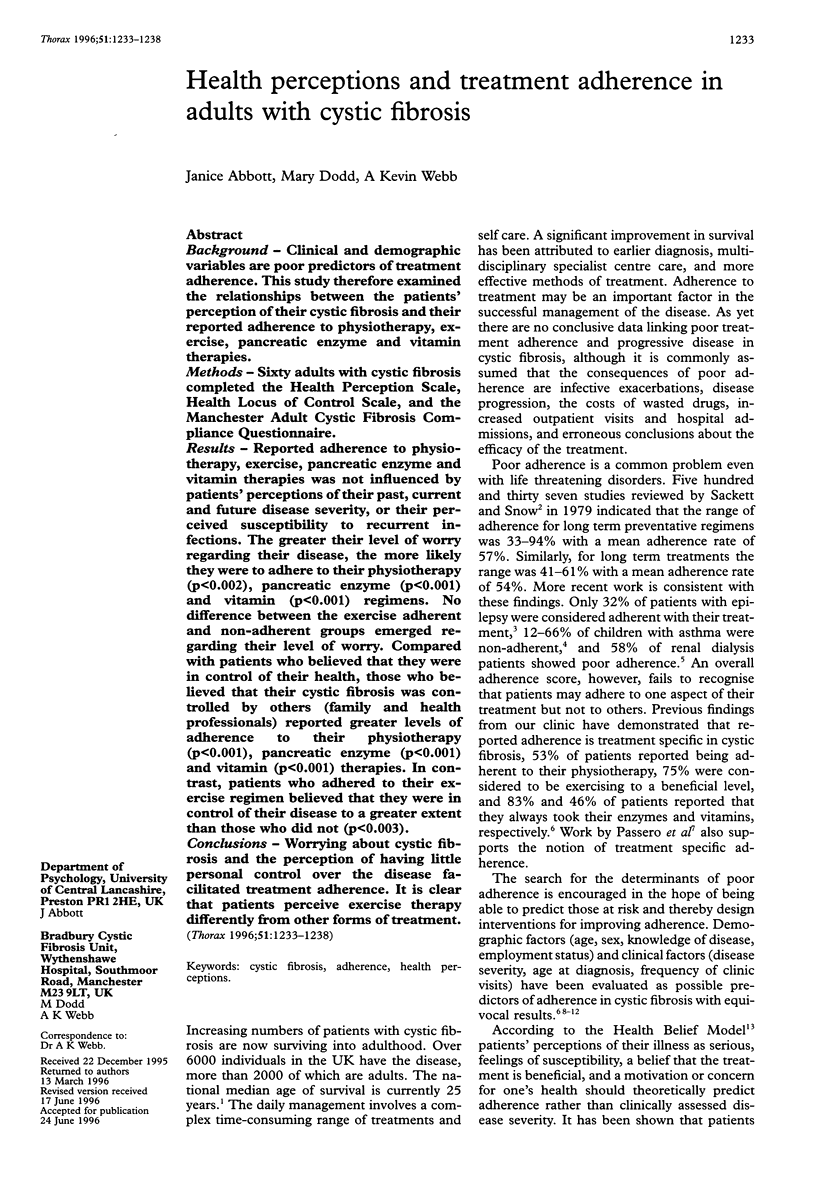
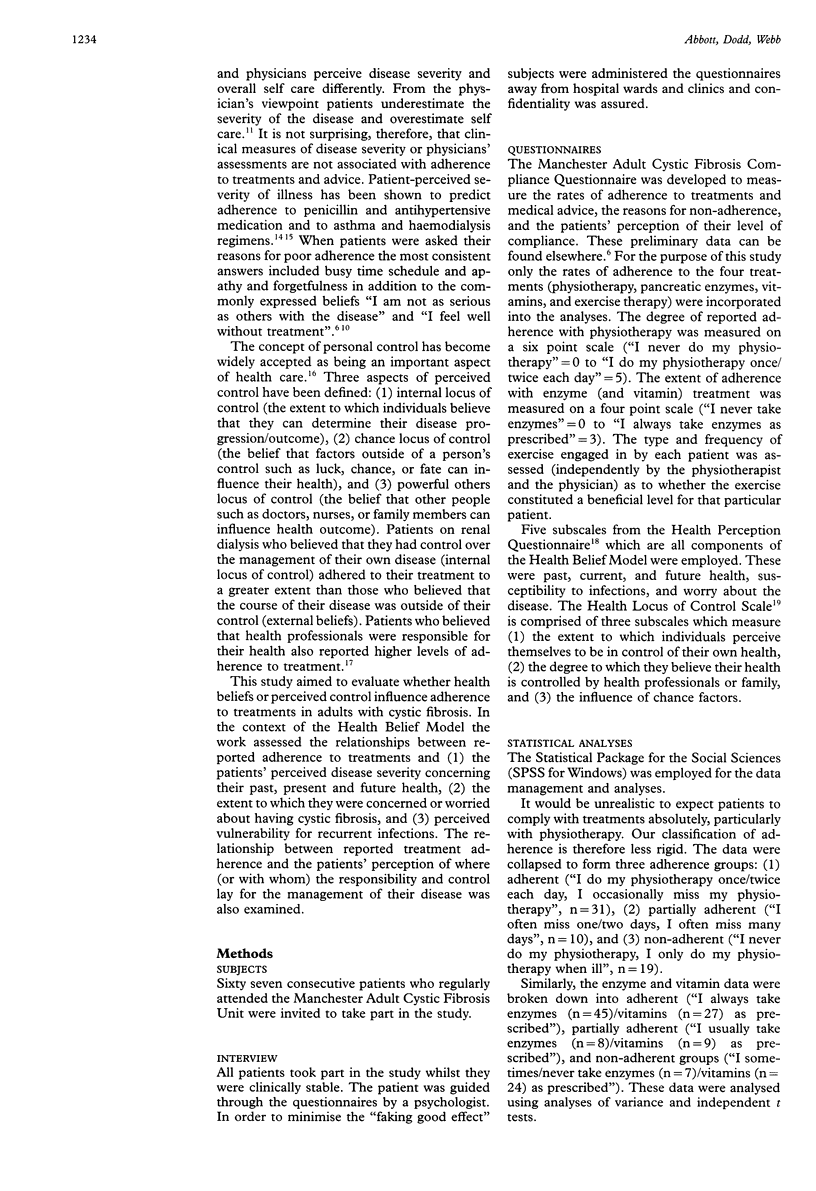
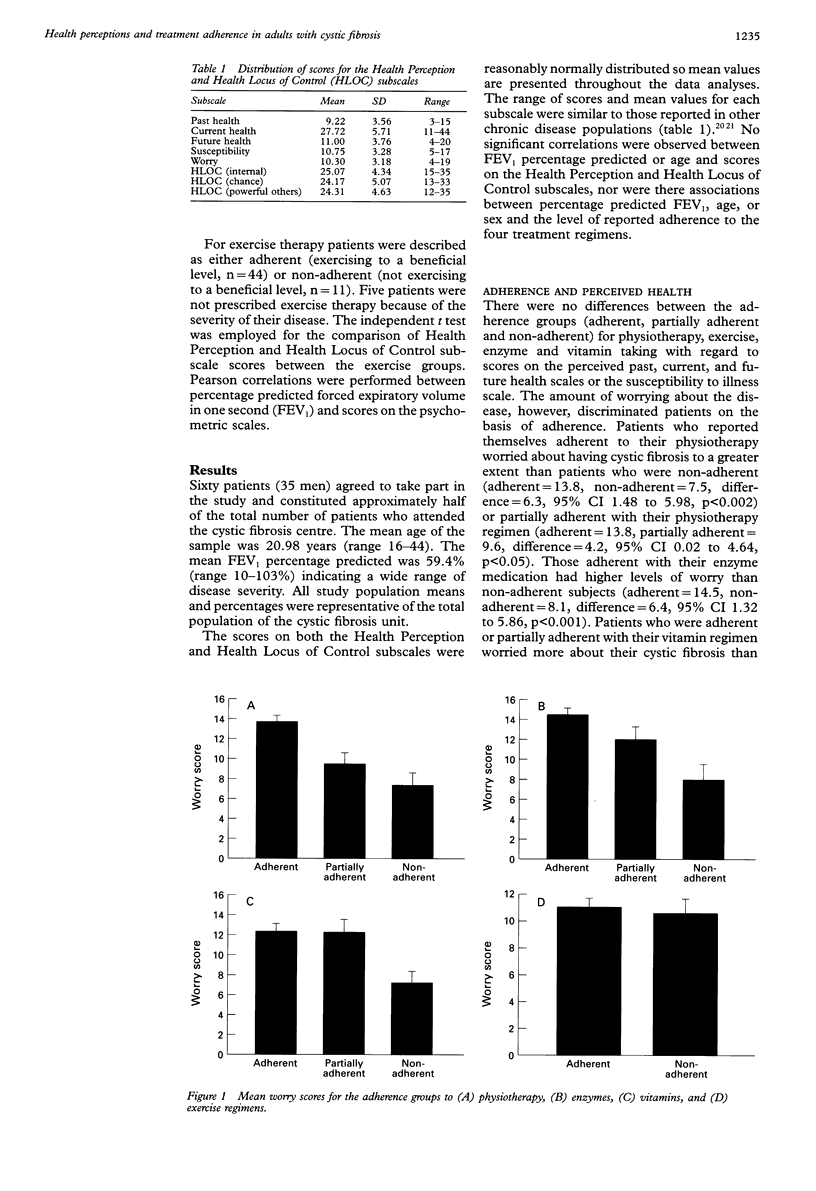
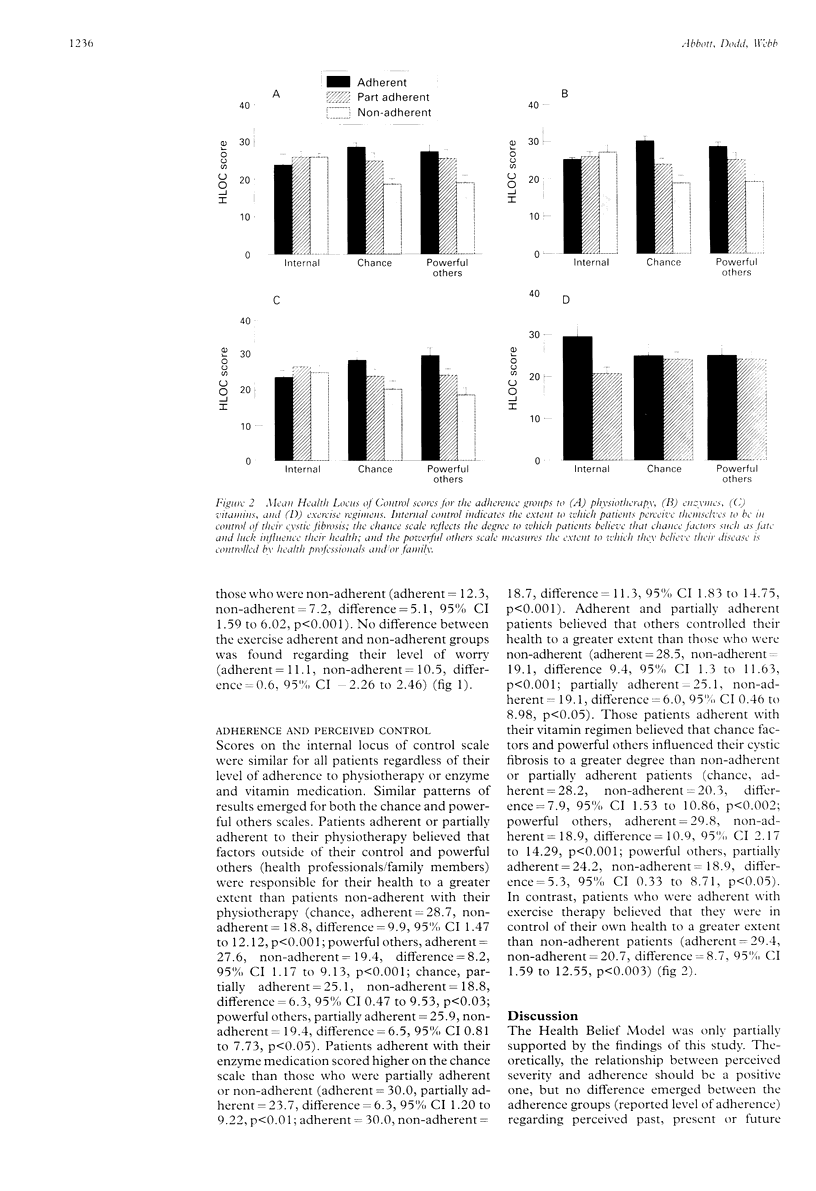
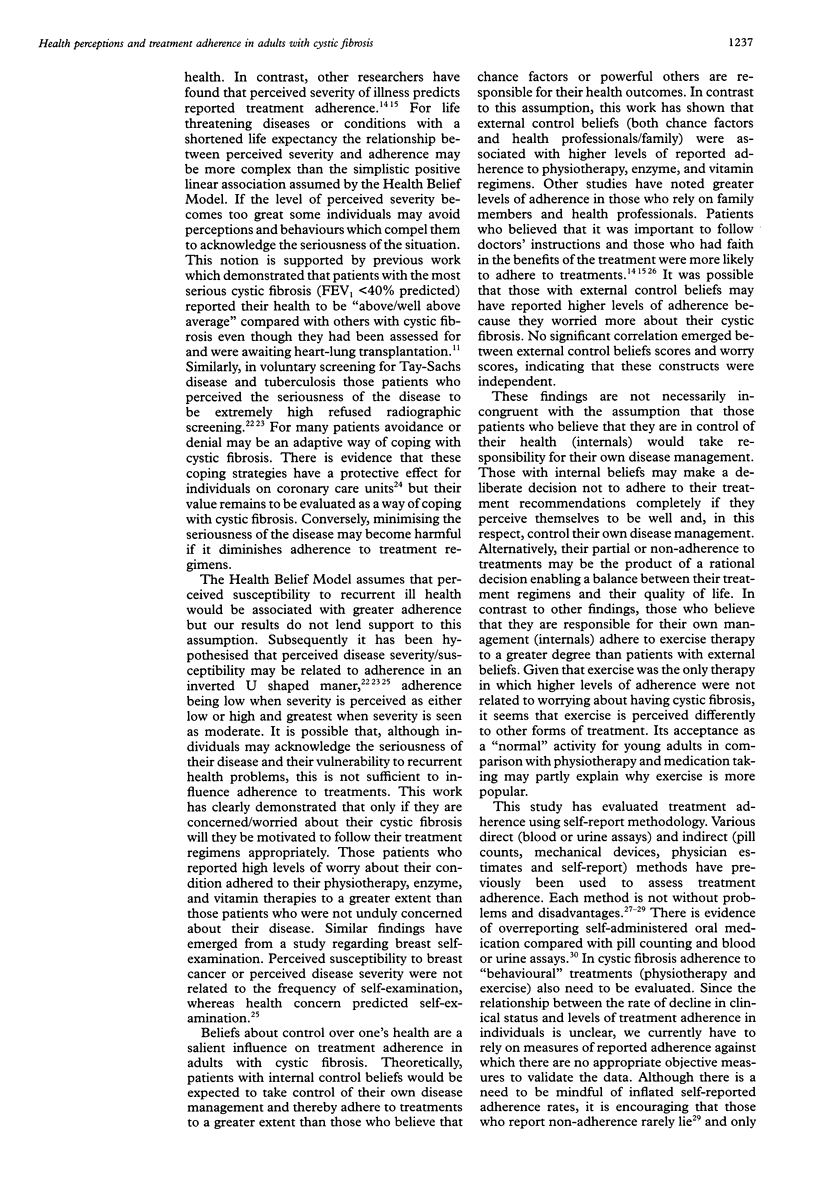
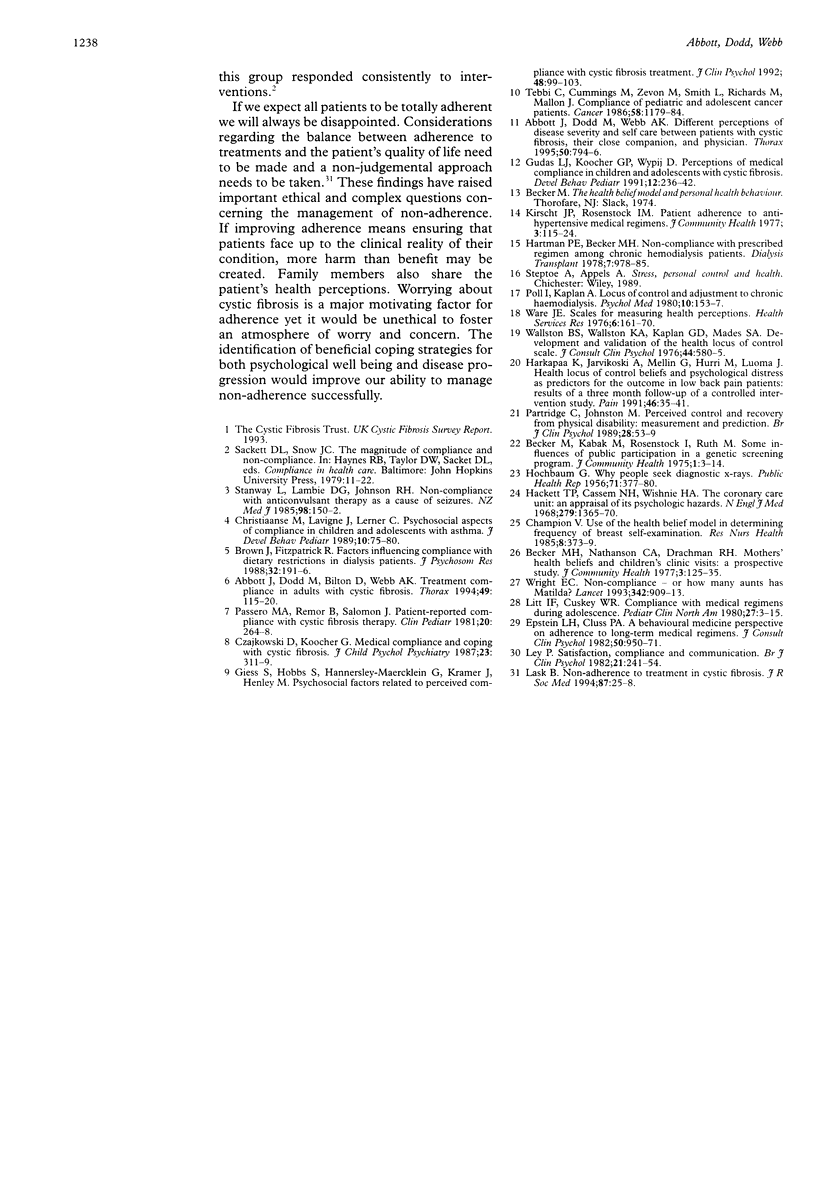
Selected References
These references are in PubMed. This may not be the complete list of references from this article.
- Abbott J., Dodd M., Bilton D., Webb A. K. Treatment compliance in adults with cystic fibrosis. Thorax. 1994 Feb;49(2):115–120. doi: 10.1136/thx.49.2.115. [DOI] [PMC free article] [PubMed] [Google Scholar]
- Abbott J., Dodd M., Webb A. K. Different perceptions of disease severity and self care between patients with cystic fibrosis, their close companions, and physician. Thorax. 1995 Jul;50(7):794–796. doi: 10.1136/thx.50.7.794. [DOI] [PMC free article] [PubMed] [Google Scholar]
- Becker M. H., Kaback M. M., Rosenstock I. M., Ruth M. V. Some influences on public participation in a genetic screening program. J Community Health. 1975 Fall;1(1):3–14. doi: 10.1007/BF01318939. [DOI] [PubMed] [Google Scholar]
- Becker M. H., Nathanson C. A., Drachman R. H., Kirscht J. P. Mothers' health beliefs and children's clinic visits: a prospective study. J Community Health. 1977 Winter;3(2):125–135. doi: 10.1007/BF01674234. [DOI] [PubMed] [Google Scholar]
- Brown J., Fitzpatrick R. Factors influencing compliance with dietary restrictions in dialysis patients. J Psychosom Res. 1988;32(2):191–196. doi: 10.1016/0022-3999(88)90054-2. [DOI] [PubMed] [Google Scholar]
- Champion V. L. Use of the health belief model in determining frequency of breast self-examination. Res Nurs Health. 1985 Dec;8(4):373–379. doi: 10.1002/nur.4770080410. [DOI] [PubMed] [Google Scholar]
- Christiaanse M. E., Lavigne J. V., Lerner C. V. Psychosocial aspects of compliance in children and adolescents with asthma. J Dev Behav Pediatr. 1989 Apr;10(2):75–80. [PubMed] [Google Scholar]
- Czajkowski D. R., Koocher G. P. Medical compliance and coping with cystic fibrosis. J Child Psychol Psychiatry. 1987 Mar;28(2):311–319. doi: 10.1111/j.1469-7610.1987.tb00213.x. [DOI] [PubMed] [Google Scholar]
- Epstein L. H., Cluss P. A. A behavioral medicine perspective on adherence to long-term medical regimens. J Consult Clin Psychol. 1982 Dec;50(6):950–971. doi: 10.1037//0022-006x.50.6.950. [DOI] [PubMed] [Google Scholar]
- Geiss S. K., Hobbs S. A., Hammersley-Maercklein G., Kramer J. C., Henley M. Psychosocial factors related to perceived compliance with cystic fibrosis treatment. J Clin Psychol. 1992 Jan;48(1):99–103. doi: 10.1002/1097-4679(199201)48:1<99::aid-jclp2270480114>3.0.co;2-5. [DOI] [PubMed] [Google Scholar]
- Gudas L. J., Koocher G. P., Wypij D. Perceptions of medical compliance in children and adolescents with cystic fibrosis. J Dev Behav Pediatr. 1991 Aug;12(4):236–242. [PubMed] [Google Scholar]
- HOCHBAUM G. M. Why people seek diagnostic x-rays. Public Health Rep. 1956 Apr;71(4):377–380. [PMC free article] [PubMed] [Google Scholar]
- Hackett T. P., Cassem N. H., Wishnie H. A. The coronary-care unit. An appraisal of its psychologic hazards. N Engl J Med. 1968 Dec 19;279(25):1365–1370. doi: 10.1056/NEJM196812192792504. [DOI] [PubMed] [Google Scholar]
- Härkäpä K., Järvikoski A., Mellin G., Hurri H., Luoma J. Health locus of control beliefs and psychological distress as predictors for treatment outcome in low-back pain patients: results of a 3-month follow-up of a controlled intervention study. Pain. 1991 Jul;46(1):35–41. doi: 10.1016/0304-3959(91)90031-R. [DOI] [PubMed] [Google Scholar]
- Kirscht J. P., Rosenstock I. M. Patient adherence to antihypertensive medical regimens. J Community Health. 1977 Winter;3(2):115–124. doi: 10.1007/BF01674233. [DOI] [PubMed] [Google Scholar]
- Ley P. Satisfaction, compliance and communication. Br J Clin Psychol. 1982 Nov;21(Pt 4):241–254. doi: 10.1111/j.2044-8260.1982.tb00562.x. [DOI] [PubMed] [Google Scholar]
- Litt I. F., Cuskey W. R. Compliance with medical regimens during adolescence. Pediatr Clin North Am. 1980 Feb;27(1):3–15. doi: 10.1016/s0031-3955(16)33815-9. [DOI] [PubMed] [Google Scholar]
- Partridge C., Johnston M. Perceived control of recovery from physical disability: measurement and prediction. Br J Clin Psychol. 1989 Feb;28(Pt 1):53–59. doi: 10.1111/j.2044-8260.1989.tb00811.x. [DOI] [PubMed] [Google Scholar]
- Passero M. A., Remor B., Salomon J. Patient-reported compliance with cystic fibrosis therapy. Clin Pediatr (Phila) 1981 Apr;20(4):264–268. doi: 10.1177/000992288102000406. [DOI] [PubMed] [Google Scholar]
- Poll I. B., De-Nour A. K. Locus of control and adjustment to chronic haemodialysis. Psychol Med. 1980 Feb;10(1):153–157. doi: 10.1017/s0033291700039696. [DOI] [PubMed] [Google Scholar]
- Stanaway L., Lambie D. G., Johnson R. H. Non-compliance with anticonvulsant therapy as a cause of seizures. N Z Med J. 1985 Mar 13;98(774):150–152. [PubMed] [Google Scholar]
- Tebbi C. K., Cummings K. M., Zevon M. A., Smith L., Richards M., Mallon J. Compliance of pediatric and adolescent cancer patients. Cancer. 1986 Sep 1;58(5):1179–1184. doi: 10.1002/1097-0142(19860901)58:5<1179::aid-cncr2820580534>3.0.co;2-e. [DOI] [PubMed] [Google Scholar]
- Wallston B. S., Wallston K. A., Kaplan G. D., Maides S. A. Development and validation of the health locus of control (HLC) scale. J Consult Clin Psychol. 1976 Aug;44(4):580–585. doi: 10.1037//0022-006x.44.4.580. [DOI] [PubMed] [Google Scholar]
- Wright E. C. Non-compliance--or how many aunts has Matilda? Lancet. 1993 Oct 9;342(8876):909–913. doi: 10.1016/0140-6736(93)91951-h. [DOI] [PubMed] [Google Scholar]


